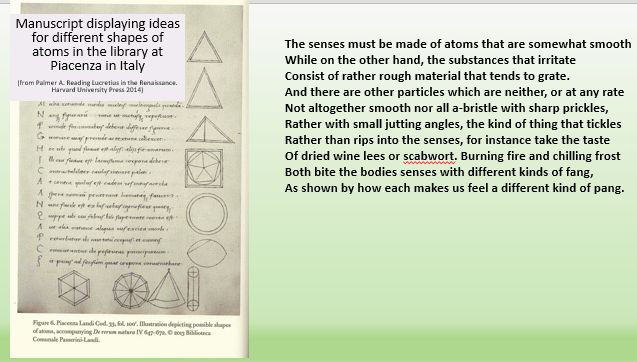

 |
Page
29
|
|
Although Epicurean atoms are the basic unit, they were thought to vary in shape and size in order to provide differing properties i.e. the difference between sweet and sour, rough and smooth. It was thought some had interlocking hooks so they could create solids whereas smooth would form liquids. There very tiny ones that could slip between bigger ones to allow for sounds and thoughts that could penetrate the body: Book 2 422 The senses must be made of atoms that are somewhat smooth The screen shows a manuscript in the Biblioteca Communale Passerini-Landi
in Piacenza where someone has tried to imagine different shapes for atoms. Joke: male atom goes to a party and complains that every time he bumps into a good-looking female atom she shoots off into space in a straight trajectory so he can never get to know her. This posed a problem for the Epicurean world. If particles bumped into each other they would rebound and veer off in different directions and their trajectories would get further and further apart with time. The two problems were how compounds would ever form and if everything was predetermined from the first interaction how could you have natural variation or free will. Epicurus came up with the SWERVE. He proposed atoms have a slight random swerve which makes them curve in flight and strike one another unpredictably so they would ricochet in random patterns but also get tangled up to form substances that eventually became worlds, stars and human beings. Because of the swerve, atoms are not locked into predictable patterns leaving room for free will, spontaneous choices and an element of chance and freedom of choice.
|